CRM Software
Effective CRM software makes sure customer relationships remain personal, even as they evolve.
Complete guide to the best CRM software
Last updated February 16, 2024
Integrating CRM technology into your business isn’t always easy. But in 2021, it’s become a necessity.
Whether you’re concerned about staying compliant with the EU’s General Data Protection Regulation (GDPR), trying to integrate your sales strategy and CRM, or trying to discover leads, boost conversion, or make customers happier, it’s important to pick the best CRM software for your business.
In this newly-updated guide, you’ll learn everything you need to know about CRM products: what a CRM system is, its benefits, the types and tools, how to choose the best CRM platform for your business, and our top ten CRM recommendations for 2021.
- Key features of a CRM system
- Benefits of customer relationship management software
- What are different types of CRM systems?
- Which tools can integrate with sales CRM software?
- Top 10 CRM software applications
- A summary of the best CRM systems & tools
- How to choose the right CRM platform for your business?
- When is a good time to implement a CRM system?
- Additional FAQs on CRM systems
- Try CRM software for free
What are the key features of a CRM system?
The top sales CRM software in 2021 will have most (if not all) of the following features:
Unified contact management
Contact management software that helps you go beyond simply storing the names and data of potential and current customers in a centralised contact database. This fundamental CRM feature also allows you to:
- Categorise, group, and search contacts in order to customise your marketing and sales strategies
- Track all interactions, emails, calls, and messages to ensure communication is smartly timed and personalised
Pipeline coordination and automation
One of the most remarkable features of a well-integrated CRM system is its ability to increase sales pipeline productivity. When developing streamlined CRM sales process steps, CRM tools can:
- Automate prospecting and lead generation
- Streamline the identification of qualified leads through lead scoring tools
- Curate personalised quotes based on detailed customer data
- Track closing successes and failures
- Supply valuable insights about why deals are ultimately won or lost
But make sure you provide time for your sales teams to integrate CRM best practices to fully capitalise on these time-saving sales pipeline tools.
After all—bells and whistles don’t make a difference if your team doesn’t know how to play them.
A user-friendly CRM dashboard
Your CRM dashboard is the real-time visual interface your team sees every day. So for CRM integration purposes, you want to ensure it’s user-friendly and customisable.
Whatever your team goals, process, and structure, your CRM dashboard should provide the following CRM tools.
- Easily tracked calendars, notes, appointments, and tasks
- Visually organised emails, calls, and messages
- Analytics for top deals, new deals, closed deals, etc.
- Tracking of revenue goals and pipeline information
- Forcasted sales and sales performance metrics
A customisable dashboard guarantees you and your team aren’t overwhelmed by data you don’t need.
Organise your work life, and prioritise your CRM insights, by choosing a CRM with a flexible and easy-to-navigate dashboard.
Data-driven CRM reports
One of the most powerful CRM tools is the collection, organisation, and analysis of key sales and marketing metrics.
With the effortless generation of valuable CRM reports, you’ll gain a comprehensive understanding of your sales and marketing operations.
They’ll empower you to…
- Quickly pinpoint the key factors driving successful customer interactions
- Refine your sales processes
- Locate the areas that need the most improvement.
Mobile and cloud CRM applications
Most CRM solutions now offer mobile CRM with Cloud CRM applications that users can access from anywhere.
The latest trends actually show that teams who utilise mobile- and cloud-based CRM solutions are nearly three times more effectiveat hitting sales quotas than those using non-mobile CRM systems.
With more employees working from home than ever, companies in 2021 need easy remote access to customer data. Mobile and cloud tools give teams a data repository with unified processes, procedures, workflows and tracking, accessible at any time.
CRM features across the board
The following features are common, but not universal. Determine your CRM requirements to find the best fit for your company.
- Robust prospecting functionality
- Lead management software and lead scoring
- Sales forecasting and data analytics
- Email automation
- Sales performance management
- Seamless integrations
- Campaign management
- Ability to build your own CRM
Benefits of customer relationship management software
Integrating a CRM platform into your company’s workflow can be a big shift for all departments—marketing, sales, customer service, IT, finance—but it has enormous benefits as well.
Below we’ll explore three beneficial ways a CRM platform will impact your business.
Improve customer satisfaction rates
A CRM system doesn’t just create a centralised repository of customer data. A good one can also integrate with customer service platforms, and help you understand when customers need help.
Happy customers are loyal customers, and loyal customers recommend your business to their friends and network. Use sales CRM analytics to understand when and why customers are miffed. Adjust your process accordingly. Repeat!
Increase productivity through smart automation
CRM automation tools should be intuitive, time-saving, and leave your salespeople with more capacity to focus on what they love—fostering successful customer relationships and closing deals.
For example, with the help of automated CRM processes, companies have been able to cut proposal times from days to hours, saving companies significant time and money.
In fact, some gurus have estimated that about one third of all sales tasks can be automated, and companies that incorporate sales automation have 53% higher conversion rates and 3.1% higher annual growth.
Enhance communication and coordination between departments
Implementing CRM technology is the best way to ensure that marketing and sales efforts are synchronised.
A sales CRM platform makes it easy to share data between departments. That’ll help you track where customers are in the pipeline in real time, check support tickets, and provide a unified customer experience.
CRM technology helps marketing teams identify better-qualified leads, sales teams personalise communication, and customer support teams understand exactly what each customer needs—all while staying coordinated.
What are different types of CRM software?
CRM software can come with a wide variety of features, as demonstrated above.
Different types of CRM software will lean towards certain areas of functional focus, so knowing your own unique business needs will help determine which one is the best for you. The following are common types of CRM software:
Analytical CRM
Analytical CRM software tends to appeal to companies that want to dig into data visualisation and analytics.
This type of software focuses on tracking customer retention rates, pipeline cycle timelines, revenue and sales data.
These platforms go beyond simple contact management and provide sales forecasting and advanced metric analysis for the data-hungry among us.
Operational CRM
Operational CRM solutions are business-management oriented, with marketing and sales automation at the forefront.
These CRM platforms emphasise contact management, lead scoring, lead management, and campaign tracking, giving a handy boost to companies that want to boost operational efficiency.
Collaborative CRM
Collaborative CRM solutions are all about making customers happy. They seek to improve customer retention and satisfaction rates by streamlining the flow of information between teams.
This type of platform emphasises data-sharing between marketing, sales, customer service, and even vendors and external stakeholders, in order to unify communication and personalise customer interactions.
Which tools can integrate with sales CRM software?
When bringing a new CRM system into your workflow, it doesn’t make sense to start from scratch. That’s why choosing a CRM tool that can easily integrate with your existing software systems is a must.
CRM integration seamlessly connects your CRM and other third-party applications you may already be using. Integrating will reduce needless clicking back and forth between applications, saving your pointer finger and mouse unnecessary exercise.
Every CRM program will have slightly different interfaces and learning curves, but all should integrate smoothly with any apps your business is currently using. Use them to replace scattered systems with all-in-one, centralised communication.
The following tools can commonly integrate with CRM software:
Integrating email into your CRM is a nifty boon to your communication and scheduling. Cloud-based CRM programs with mobile apps make it even easier to send and read emails from anywhere.
Calendars
Most CRM systems can easily connect with digital calendars such as Google or Outlook so you never miss an appointment. Two-way integration means you can create events in either platform, and they’ll sync up instantly.
Communication software
As common as tools like Slack and Zoom have become in 2021, it only makes sense that a CRM platform would integrate with these applications.
Chat with clients and team members within your CRM system without the irritating hassle of keeping two dozen browser windows open.
Document creators
Professional document-creation applications such as PandaDoc allow the painless creation of proposals, quotes, contracts, and invoices.
When you integrate with a CRM, it’ll take saved client data and auto-populate documents. It can even send them off for quick (and legally binding) electronic signatures.
Social media
In 2021, CRM apps can easily integrate with social media accounts on platforms such as Facebook, Twitter, Instagram, and LinkedIn. They even have the ability to automate posting across channels, for clear and consistent branding.
Accounting software
Save time on data entry and never worry about accuracy again when you integrate accounting software such as QuickBooks, Xero, or Freshbooks into your CRM system. Easily access information about invoices, client transactions, and vendor data whenever you need it.
Top 10 CRM software and applications
-
Zendesk Sell -
HubSpot -
Less Annoying -
Creatio -
Apptivo
-
Insightly -
iSales -
Salesforce -
Copper -
ZohoCRM
1. Zendesk Sell
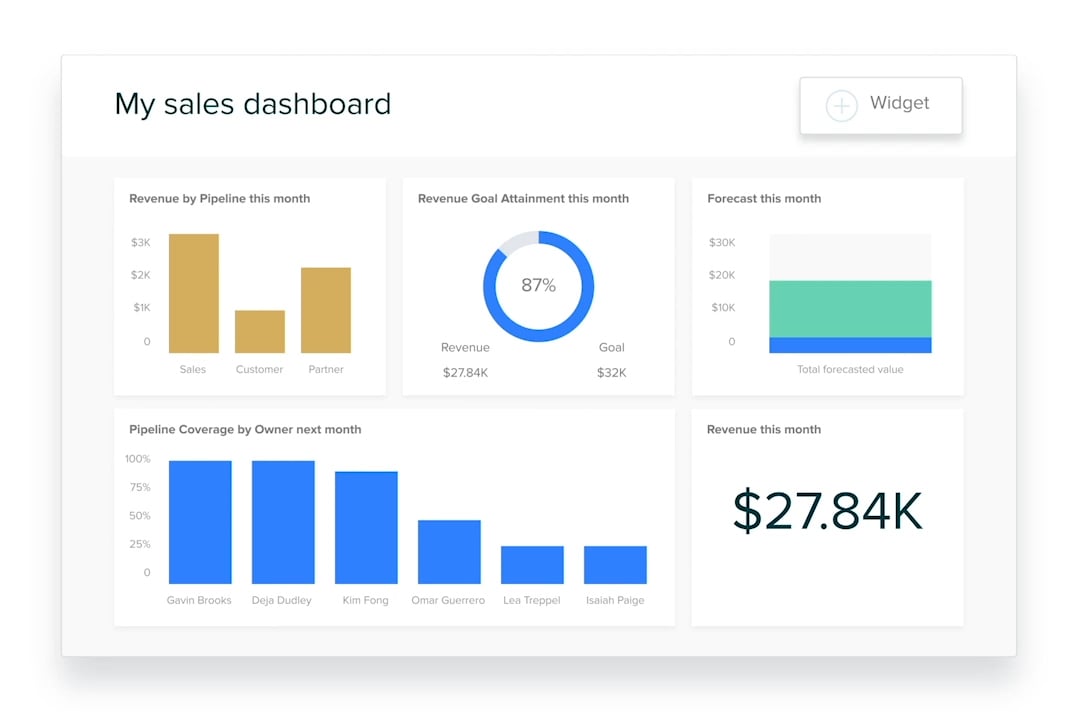
Zendesk Sell is a top CRM system for several reasons. The best may be the self-service portal, which lets customers easily help themselves before hassling your agents.
It’s loaded with a variety of industry-leading CRM tools (including a user-friendly mobile app), while simultaneously designed to be as user-friendly as possible.
Sell’s email intelligence tool allows for seamless tracking of all email communication, along with real-time push notifications, activity reporting, and email template automation.
Its auto dialer allows reps to make calls without lifting a finger, while it logs and records every call and provides access to scripts, notes, and out-of-the-box call analytics so businesses can keep tabs on call count, duration, and results.
Zendesk Sell also comes equipped with sales prospecting functionality that takes advantage of an untapped market of over 200 million professionals. Businesses of all sizes use Sell to identify prospects and create targeted lists full of verified, robust, and current records.
Overall, the intuitive and customisable interface means less overall hair pulling while your team figures out how to use all of its amazing features—like its mobile and cloud applications, marketing automation system, and easy-to-use collaboration tools.
Features of Zendesk’s customisable sales CRM software:
- Email tracking and automation
- Activity reporting
- Sales dashboard and reporting
- Mobile CRM
- Automatic dialer with text capability
- Call analytics
- Out-of-the box integrations
- Contact management
- Prospect discovery and verification
- Lead management
When you have the ability to fully manage your sales and marketing tools in one place and integrate with a help desk, customer service wins.
2. Hubspot
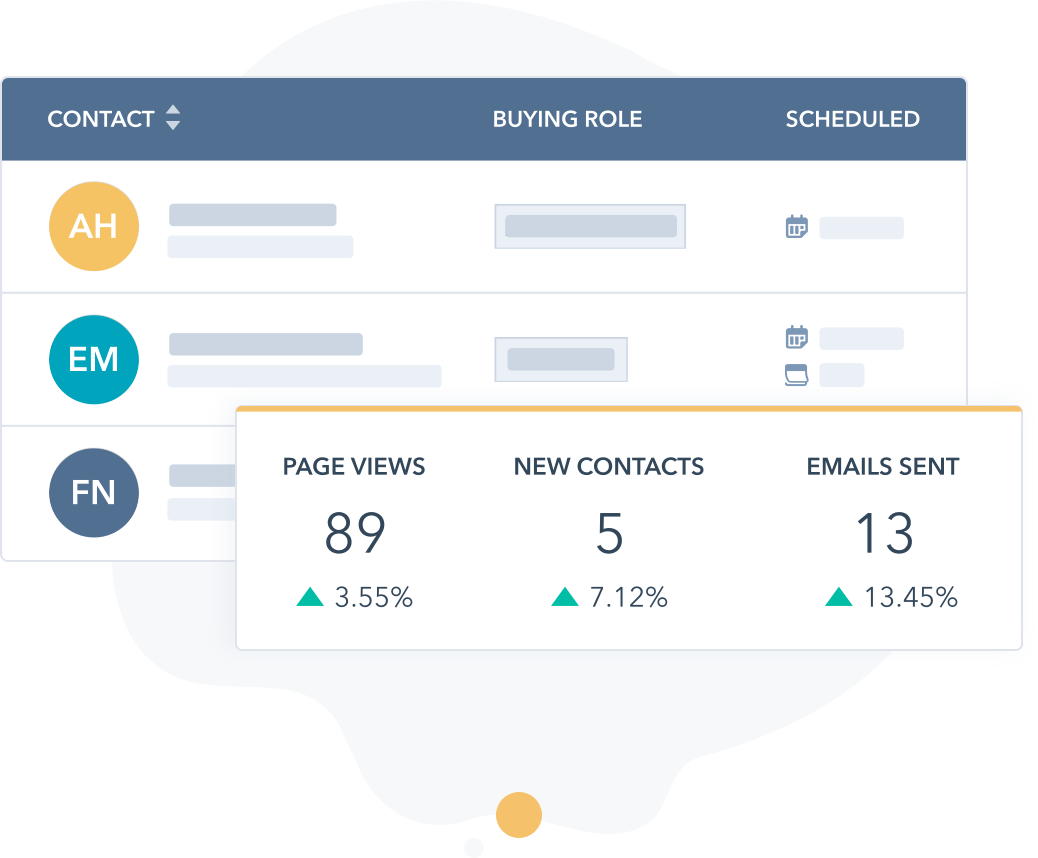
Hubspot is a popular choice for businesses just getting started on their customer relationship management software journey.
With a clean dashboard centralising all of your most important CRM tools, Hubspot makes your data as easy to find as the “leave meeting” button after a five-hour Zoom call.
And, like most CRM programs, Hubspot does offer customisation and features like conversation intelligence and email tracking.
3. Less Annoying
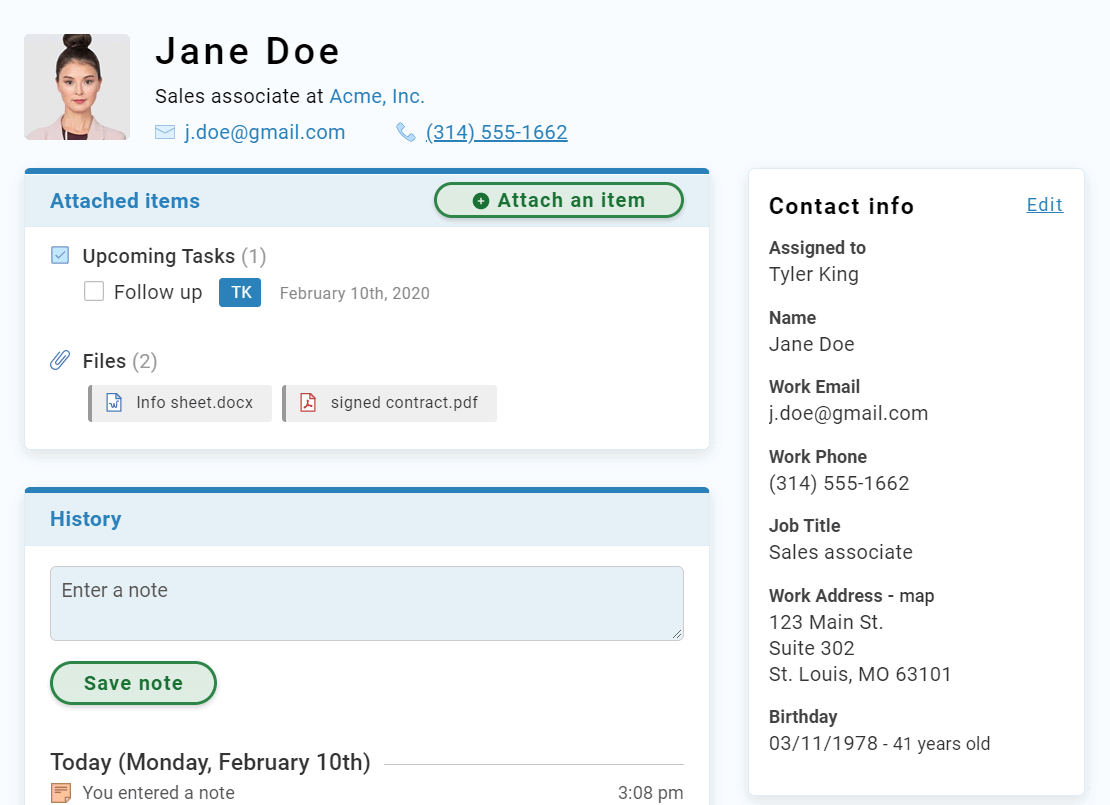
If you came here wondering “what is a CRM system?” Less Annoying might be the sales CRM platform for you.
Based on its name alone, it’s clear Less Annoying’s key selling feature is its simplicity, making it a solid choice for small businesses taking their first leap into the world of CRM.
While it may lack the long list of features of other CRM system options, Less Annoying prides itself on making sure your business doesn’t pay for more features than it needs.
4. Sales Creatio
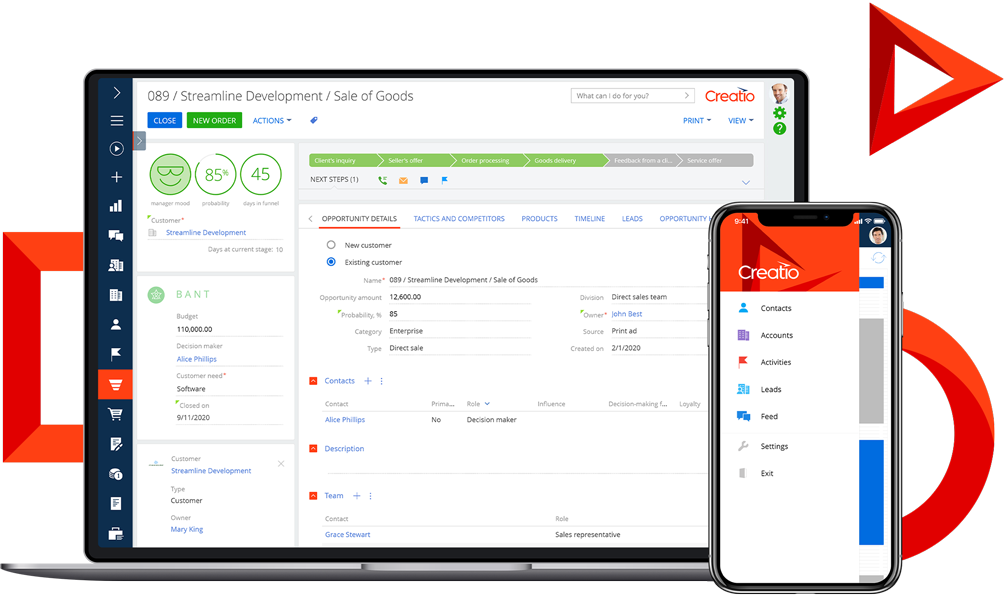
Built for midsize to large corporations, Sales Creatio offers the full scope of customer relationship management software, allowing you to manage sales, marketing, and services all from one spot.
Sales Creatio’s claim to fame is its low-code technology, which allows for a wide range of customisation options with little to no coding know-how, which is a great feature if your team happens to include anyone who self-identifies as technologically challenged.
5. Apptivo
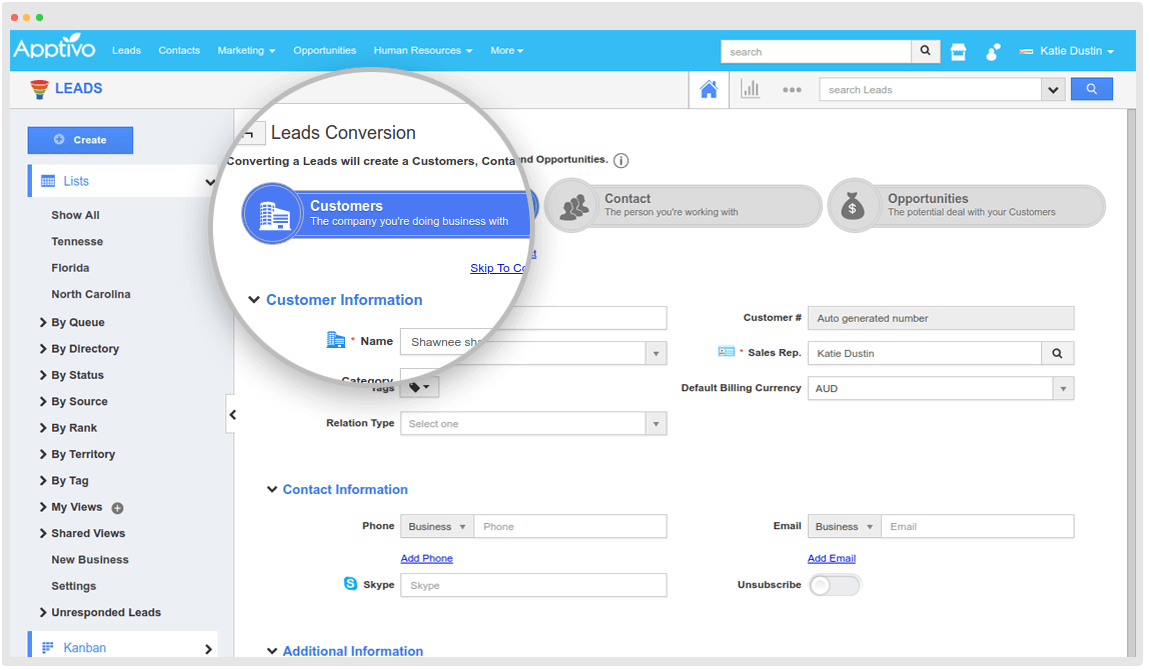
With an impressively compatible and fully Online CRM system, Apptivo allows you to centralise all of your customer care needs from any device, using any browser.
It does boast a smaller list of features than many of its competitors, but it still has 65+ integrated applications and a sturdy Sales Pipeline Management system. That means there’s never a wasted moment when tracking prospective customers.
6. Insightly

If everyone on your team is a gung-ho Google wizard, Insightly may be one of your top CRM software options.
Using your existing Google App account, Insightly allows you to fully integrate all of your customer relations needs into a program you’re already comfortable with. In short, your team can spend less time learning new software.
If you do end up with questions, however, you may find Insightly’s lack of 24/7 support frustrating—especially if your team is spread out across multiple time zones.
7. iSales

iSales is a solid CRM platform option with a long list of features, including data import/export and two-way messaging.
With Voice over Internet Protocol options that give sales agents more avenues of contacting leads and customers, iSales packs some serious CRM punch.
8. Salesforce
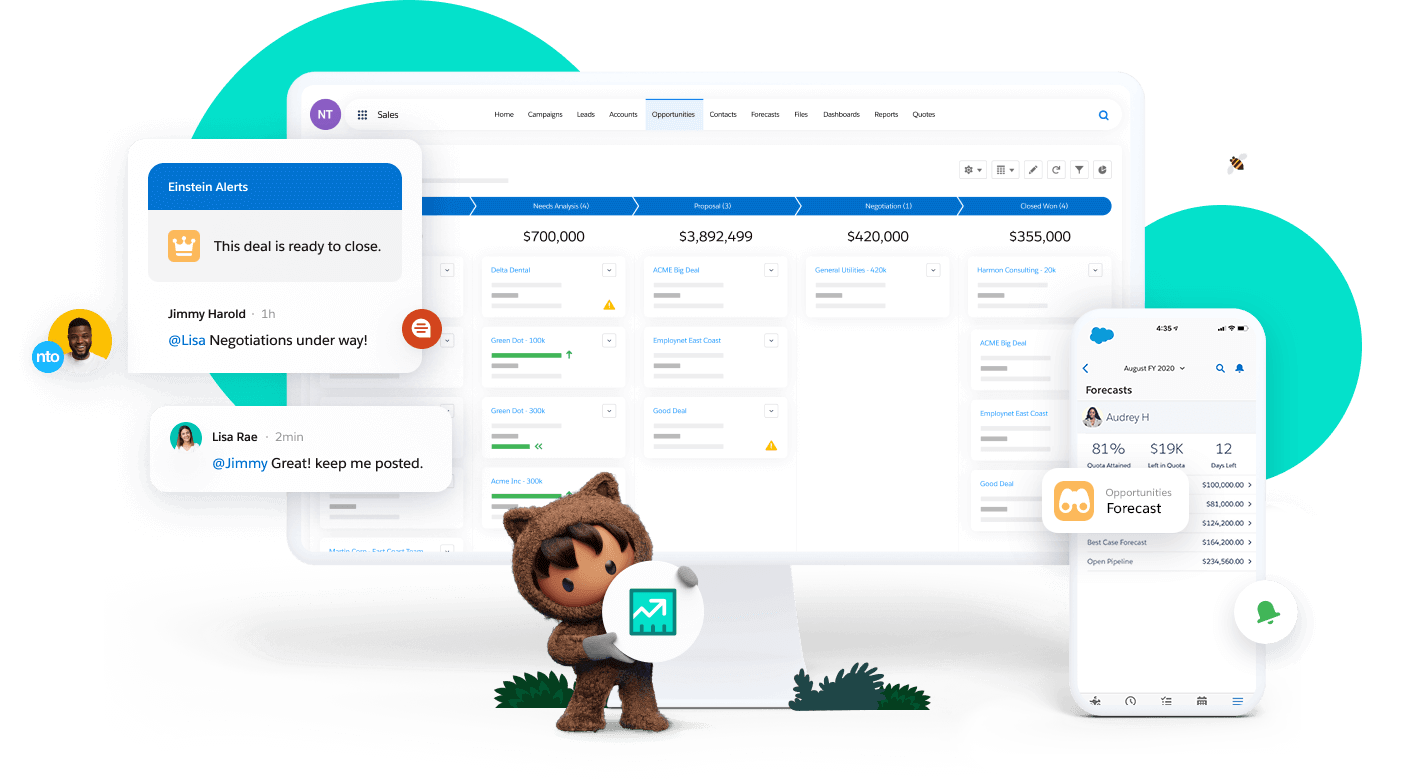
Salesforce is a well-known heavyweight in the world of CRM technology.
Thanks to its artificial intelligence capabilities, users can automate a lot of the usual workflow. It’s a nifty way to free your support teams from tedious data entry and help them focus more on sales.
With a long list of features (including Commission Management and Call Center Management), Salesforce sometimes has more bells and whistles than a small business needs.
9. Copper

Like Insightly, Copper is a brand of CRM that was built with Google users in mind.
People choose Copper for its total G-Suite integration capabilities. Although its features aren’t necessarily unique, users routinely cite Copper’s easy user experience as its best quality.
10. ZohoCRM
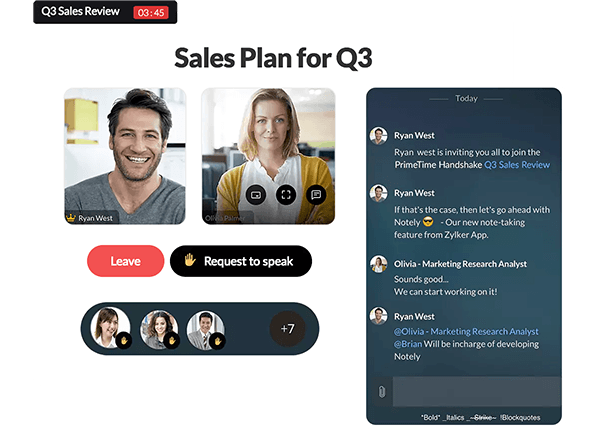
Unlike some of its competitors, which are usually best suited for use by either small or large companies, ZohoCRM is designed to handle your company’s needs at any size.
ZohoCRM comes with all the features you’d expect from a top CRM software brand, and even boasts an AI companion named Zia. The folks at ZohoCRM know that there are multitaskers among us, so they created Zia to lend a hand to agents who are using both of theirs.
Zia can answer your questions, fetch sales reports, and even take note dictation.
A summary of the best CRM software & tools
Check out how our top 10 picks stack up against each other in this handy comparison chart:
24/7 live rep support | Self-service portal | Lead generation | Territory management | Data import/export | Cloud | Mobile app | Email marketing | |
|---|---|---|---|---|---|---|---|---|
| | | | | | | | |
| | | | | | | | |
| | | | | | | | |
| | | | | | | | |
| | | | | | | | |
| | | | | | | | |
| | | | | | | | |
| | | | | | | | |
| | | | | | | | |
| | | | | | | | |
How do you choose the right CRM platform for your business?
Choosing the best CRM for your company isn’t an easy task. Sure, you want a long list of features, excellent integration, clean mobile options, and lots of cloud capacity. But keep in mind that once you decide on a CRM system, your team will have to learn how to use it.
Before buying, know your CRM requirements for your brand and business, and make sure you understand your team’s technological know-how.
Choosing the right Customer Relationship Management software can drastically improve your team’s productivity, but that’s only if the CRM software itself is easy to use. Substituting one headache for another isn’t going to please anyone, so doing your research is key.
Cost is another factor that companies must consider when choosing a CRM platform. Make sure you not only determine your budget, but actually understand the true CRM implementation cost of whatever software you’ve settled on.
As you would before making any business decision, it’s best to compare the top contenders in the field and consider which one is best for you and your team’s workflow.
When is a good time to implement a CRM system?
If you’re searching for information about CRM solutions, you’ve likely recognised that your business may benefit from one.
Even if your company is still relatively small, CRM for small businesses can boost productivity and help you to scale faster, without becoming overwhelmed.
At a certain point, keeping track of customers, sales, and loads of more or less relevant data simply gets too complicated. If your teams are drowning in spreadsheets, lists of email addresses, and poorly organised email templates, CRM software might be calling your name.
CRM software will help centralise your customer information, and provide you with vital insights into key business performance metrics that are simply not accessible anywhere else.
CRM software FAQs
Give CRM software a try
Zendesk Sell is an intuitive-yet-powerful sales CRM, designed with customer relationships in mind. Our cloud-based CRM platform makes accessing information easy for your entire team—anytime and anywhere.
It’s simple: customers are happier when they feel heard. Zendesk Sell gives you the tools to personalise customer interactions and foster collaboration across departments—through every stage of the customer experience.
We have more information about this. Have a look below.
There’s a lot more where this came from. Keep exploring the world of CRM.
